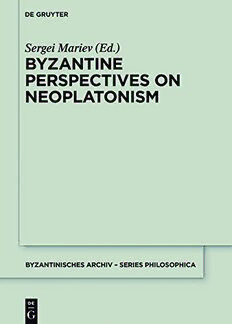
Byzantine Perspectives on Neoplatonism PDF
Preview Byzantine Perspectives on Neoplatonism
Byzantine Perspectives on Neoplatonism Byzantinisches Archiv – Series Philosophica Herausgegeben von Sergei Mariev Wissenschaftlicher Beirat: John Demetracopoulos, Jozef Matula, John Monfasani, Inmaculada Pérez Martín, Brigitte Tambrun-Krasker Band 1 Byzantine Perspectives on Neoplatonism Edited by Sergei Mariev ISBN 978-1-5015-1167-7 e-ISBN (PDF) 978-1-5015-0359-7 e-ISBN (EPUB) 978-1-5015-0363-4 ISSN 1864-9785 Library of Congress Cataloging-in-Publication Data A CIP catalog record for this book has been applied for at the Library of Congress. Bibliographic information published by the Deutsche Nationalbibliothek The Deutsche Nationalbibliothek lists this publication in the Deutsche Nationalbibliografie; detailed bibliographic data are available in the Internet at http://dnb.dnb.de. © 2017 Walter de Gruyter Inc., Boston/Berlin Printing and binding: CPI books GmbH, Leck ♾ Printed on acid-free paper Printed in Germany www.degruyter.com Contents SergeiMariev NeoplatonicPhilosophyinByzantium | 1 SergeiMarievandMonicaMarchetto TheDivineBodyoftheHeavens | 31 MicheleTrizio Thewavesofpassionsandthestillnessofthesea:appropriatingneoplatonic imageryandconceptformation-theoryinmiddleByzantinecommentarieson Aristotle | 67 GraemeMiles PsellosandhisTraditions | 79 JoshuaRobinson ProclusasHeresiarch:TheologicalPolemicandPhilosophicalCommentaryin NicholasofMethone’sRefutation(Anaptyxis)ofProclus’Elementsof Theology | 103 MagdaMtchedlidze TwoConflictingPositionsRegardingthePhilosophyofProclusinEasternChristian ThoughtofthetwelfthCentury | 137 JesúsdeGaray TheReceptionofProclus:FromByzantiumtotheWest(anOverview) | 153 FlaviaBuzzetta,ValerioNapoli Elementididemonologianeoplatonicanell’opuscolobizantinoΤίναπερὶδαιμόνων δοξάζουσινἝλληνες | 175 LelaAlexidze PlethonontheGradesofVirtues:BacktoPlatoviaNeoplatonism? | 221 UdoReinholdJeck Europaentdecktdiemittelalterlichebyzantinisch-georgische Philosophie | 243 SelectedBibliography | 271 SergeiMariev Neoplatonic Philosophy in Byzantium AnIntroduction UnresolvedtensionbetweenPlatonicheritageandChristiandoctrineisoneofthehall- marksofthehistoryofByzantinephilosophy.Ontheonehand,Byzantinescholars fromallperiodsshowedsignificantinterestinthedoctrinesofPlatoandthePlaton- ists.Ontheotherhand,manyofthemperceivedthesedoctrinesasasourceoferror andevenastherootofallheresies.Inconsequence,theyfrequentlymadeattempts toharmonizeNeoplatonicdoctrineswithChristianity,butalsocriticized,refutedand even condemned them. These attempts at harmonization, criticism, refutation and condemnationwithregardtoNeoplatonictextsandauthorsconstituteafascinating chapterinthehistoryofByzantinecivilization.Thefollowingpagesdonotpretendto offeranexhaustiveoverviewofthehistoryofthereceptionofNeoplatonicphilosophy inByzantium.Theobjectiveistosketchageneral“map”ofthisvast“territory”,which is still being discovered by modern scholarship, by identifying the most important figuresandtextsthatcanbeseenas“boundaries”and“milestones”.Theindividual contributionscollectedinthisvolumewillthenprovideamoredetailedaccountof somespecificepisodesandfiguresonthis“map”,andtherebycontinuethisongoing processofdiscovery. Theendofthe5thcenturyisthemostprobabledateforthehistoricallyenigmatic figureofPs.-DionysiostheAreopagite,¹“whotransposedinathoroughlyorigi- nalwaythewholeofPaganNeoplatonismfromPlotinustoProclus,butespeciallythat ofProclusandthePlatonicAcademyinAthens,intoadistinctivelynewChristiancon- text”.²Ps.-DionysioswasafigureofconsiderableauthorityformanyByzantineschol- ars,not least because the pseudonym chosenby the otherwise unknown authorof theCorpusareopagiticumidentifieditsauthorasDionysiostheAreopagite,anAthe- niancitizenconvertedtoChristianitybytheapostlePaul,asreportedintheActsof theApostles.³Theapostolicageofthesewritings,soestablished,wasoneofthedeci- sivefactorsincementingtheirauthorityinByzantium.ThelinkbetweenProklosand Ps.-Dionysioswasthusreversed:the“holy”Dionysioswasbelievedtobetheteacher 1 Animpressivelistofca.21hypotheseswithregardtothehistoricalidentityoftheauthorofthe Corpusareopagiticum–possiblecandidatesincludeSeverosofAntioch,PetertheFuller,Peterthe Iberian,SergiosofResh‘ayna–isassembledinHathaway1969,31–35.Ontherelationshipbetween PlatonismandChristianityinthewritingsofPs.-DionysiostheAreopagitecf.Saffrey1982,Perl2007, DillonandWear2007,Dillon2014a,Beierwaltes1997. 2 CorriganandHarrington2015. 3 Cf.Acts,17,16–34,esp.32–34. DOI 10.1515/9781501503597-002 2 | S.Mariev andnotthepupilofProklos.Asthelemma“DionysiostheAreopagite”intheSuda, amassive10th-centuryByzantineencyclopedia,demonstrates,fortheByzantinesit wasProkloswhoappropriatedsomeoftheteachingsofDionysiosandnotDionysios whotransposedNeoplatonicteachingsintoaChristiancontext.⁴SomeByzantineau- thorsevenwentsofarastoaccusethe“Athenianphilosophers”ofhavinghiddenthe worksofDionysiosinordertobeabletopresentsomeofhisteachingsastheirown.⁵ AmanuscriptcontainingthewritingsofPs.-Dionysios,whichismostprobablytobe identifiedasCod.par.gr.437,arrivedfromByzantiumintheWestinSeptember827as apresentfromtheByzantineemperorsMichaelIIandTheophilostoCharlemagne’s sonandsuccessorLouisthePious,⁶thusinitiatingtherichhistoryofreceptionofthis authorintheLatinWorld. IncontrasttoPs.-Dionysios,the“GazanChristians”,⁷andinparticularAineias of Gaza,⁸ Prokopiosof Gaza⁹ and Zacharias (the Rhetor),¹⁰ attacked the Neoplaton- istsandtheirideaoftheeternityoftheworld.¹¹Theirarguments–inasignificantly lesssophisticatedandsystematicform–anticipatedsomeoftheargumentsthatJohn PhiloponosformulatedinhistreatiseDeaeternitatemundicontraProclum.¹² John Philoponos(ca.490–575),himselfastudentoftheNeoplatonicphiloso- pherAmmoniosHermeiou(ca.435–517),wrotealargenumberofworksondifferent subjects,includingcommentariesonAristotleandmedical,astronomicalandgram- maticaltreatises.¹³Arabianscholars,whoweremainlyinterestedinPhiloponos’com- mentariesonAristotle,firstnoticedanumberofcontradictoryopinionsinhiswritings andsoughttoexplainthembyhypothesizingthatPhiloponoshadwrittenhisDeae- ternitatemundicontraProclumeitherinordertodefendhimselfagainsttheChristians whohadbeenthreateninghimorbecausetheChristianshadofferedhimmoneyinex- changeforthecompositionofthiswork.Towardsthebeginningofthe20thcentury, GudemannandKrollformulatedabiographicalhypothesisthatdistinguishestwope- riodsinJohnPhiloponos’life,namelyaninitialpaganand,followingasupposedcon- versiontoChristianity,alaterChristianperiod.Theyassignedalargenumberofcom- 4 Suda,d1170ΔιονύσιοςὁἈρεωπαγίτης,ed.Adler1928. 5 Makris2000,9f. 6 Cf.McCormick1987. 7 OnChristiancultureinGazaduringthelatefifthandearlysixthcenturiescf.Champion2014,Watts 2005,Hevelone-Harper2005. 8 Cf.PLREII,“AeneasofGaza3”,p.17. 9 Cf.PLREII,“ProcopiusofGaza8”,pp.921–922. 10 Cf.PLREII,“Zacharias(theRhetor)4”,pp.1194–1195. 11 Cf.Sorabji2012,VII:“ThemainsubjectoftheTheophrastus[byAeneasofGaza]wasthehuman soul[…].ButitoverlappedinonepartwiththesubjectoftheothertwoChristiantexts,theChristians’ creationoftheworldfromabeginning,asopposedtotheNeoplatonists’eternalcreationoftheworld”. 12 Cf.Sorabji2012,VIII. 13 Acomprehensivelist,includinglesseasilyaccessiblepublications,isfoundinScholten1997,vol. 1,35–43. NeoplatonicPhilosophyinByzantium | 3 mentariesonAristotletothefirst,paganperiod,andtheDeaeternitatemundicontra Proclumandsomeother,mostlytheologicaltreatisestothesecond.However,reliable biographicaldetailsaboutJohnPhiloponos’lifearescarceintheextantsources,while thenameJohnseemstosuggestthathewasborntoaChristianfamily,andsoGude- mannandKroll’shypothesisfoundlittleacceptanceinsubsequentscholarship.¹⁴In DeaeternitatemundicontraProclum,whichcanbesecurelydatedto529,JohnPhilo- ponosmountedavigorousattackonProklos,rejectingtheideaoftheeternityofthe worldandproposinginsteadasystembasedontheideaofcreatioexnihilooftheworld andofmatter.¹⁵ ThecompositionofDeaeternitatemundicontraProclumisnottheonlymilestone intherichhistoryofthereceptionofNeoplatonicphilosophyduringthe6thcentury. Writingaround540,John,whowasthebishopofScythopolisinPalestine,became oneofthefirstByzantinescholarstowriteacommentaryontheworksofPs.-Dionysios the Areopagite. His scholia, or marginal commentaries, containing theological and philosophicalobservationsonPs.-Dionysios’text,enhanceourunderstandingofthe waysinwhichByzantinetheologiansreceivedtheideasofProklosthroughthemedi- ationofPs.-Dionysios.¹⁶Inaddition,hisscholiaconstituteoneofthefirstinstancesof thereceptionofPlotinosinByzantium.¹⁷ Maximos Homologetes orConfessor (580–662)wascertainlyoneofthe most outstanding intellectual figures of the 7th century. He was a prolific author whose theological works were widely read throughout the entire Byzantine period. Theauthorityhewieldedandthereverentialawewithwhichhiswritingswereread can be compared only to the renown that Ps.-Dionysios enjoyed during the Middle AgesintheWest.Maximos’voluminouswritings,formanyofwhichtherearestillno reliable modern critical editions, amount to – as von Balthasar aptly characterized them – a “monumental synthesis” of the theological and philosophical traditions 14 Cf.theopinionofScholten1997,vol.1,30f.whopointedoutthatcontradictoryopinionsidenti- fiableacrossmanyofPhiloponos’worksdonotconstituteareliablebasisforpostulatingdifferent phasesintheauthor’slife,especiallysincethecommentariesasagenrewerenotmeanttoserveas avehiclefortheauthor’sopinionbutrathertopropagatecommonandwidespreadviews.Verrycken 1990preferstogroupPhiloponos’worksintotwocategories,whichhesimplylabels“Philoponos-1” and“Philoponos-2”,explicitlyrefrainingfromanyattempttoassigntheworksfromeithergrouptoa periodinPhiloponos’life.Thegroup“Philoponos-1”containsworksthatshowtracesofNeoplatonic views,especiallythosetaughtintheAlexandrianschool,whileworksbelongingto“Philoponos-2” areclearlyChristianincharacter. 15 Cf.Verrycken2010,withbibliographyonpp.1143–1147.OnPhiloponos’Byzantinelegacy,cf.Bydén 2012,esp.82–85. 16 Parry2006b,224. 17 OntheuseoftheEnneadsofPlotinosinJohnofScythopolis’scholiatotheCorpusdionysiacum,cf. O’Meara1992b,56.Cf.alsoPodolak2007,RoremandJ.C.Lamoreaux1998b,Frank1987,Beierwaltes 1972aandBeierwaltesandKannicht1968. 4 | S.Mariev ofhistimes.¹⁸Withinthis“synthesis”MaximosfoundaplaceforsomecentralNeo- platonicconcepts¹⁹thatwerefamiliartohimmostlybutnotexclusivelythroughthe mediationofPs.-DionysiostheAreopagite,²⁰byadaptingNeoplatonicconceptstothe exigenciesofhisown,Christianperspective.²¹ John of Damaskos (ca. 650 – after 754) was born to an influential Arabo- Christianfamily,theMansur,whosemembershadheldimportantpostsinthefinan- cialadministrationundertheUmayyaddynasty.Helivedhisentirelifeoutsidethe politicalboundariesoftheByzantineempire,but,asaChristian,tookanactivepart in the religious and intellectual life of Byzantium. The first half of the 7th century wasaturbulentperiodinByzantinehistory.Arabinvasions,theconstantBulgarian menace,internalpoliticaldisruptionssuchastherevoltofArtabasdos,and,mostim- portantly,thefirstphaseoftheconflictoverthevenerationofimages(ca.726–787) weresomeoftheeventsthatdominatedthepoliticalandreligiouslifeofByzantium. ItisdifficulttodeterminewithprecisionwhichofhisworkswereknowninByzantium duringhislifetime.Thathisnamewasindeedwell-knownwithintheboundariesof theempireduringthisperiodisbeyondanydoubt.Asadefenderofvenerationofre- ligiousimageshewasanathematizedbytheiconoclastCouncilofHiereiain754.The factthatanecclesiasticalcouncilconvenedbytheEmperorConstantineVdirected thishighestformofecclesiasticalcensureathimcanbetakenasareliableindica- tionthatatleastsomeofhiswritingswerenotonlyreadbutalsoexercisedsignificant influenceduringthetimeleadinguptothecouncil.JohnofDamaskoswascertainly 18 Cf.vonBalthasar1988. 19 Cf.Cvetković2015andPereira2011.ForareconstructionofthewaysinwhichMaximosreceived andtransformedNeoplatonicconceptswithinhisownperspectivecf.Gersh1978b,204–260. 20 Louth2008,590observesthat“TheattributionofthescholiaontheDionysianwritingstoMax- imusoncemadeitseemthatMaximushadbeenaclosestudentofDionysius.However,therecent discovery(firstbyHansUrsvonBalthasar,andnowconfirmedbytheresearchofBeateSuchla)that mostofthescholiawerecompiledbyJohnofScythopolis[…]haschangedthetermsofthedebate.[…] TheinfluenceofDionysiusonMaximusis,however,manifest,evenifwediscountthefewscholiathat maystillbelongtoMaximus.”Cf.Tatakis2003b,65:“toMaximosbelongsthehonorofhavingintro- ducedintoChristianthoughttheNeoplatonismofPseudo-Dionysiosand,moreimportantly,hisdoing sowithoutsacrificingthesubstanceofChristianity,thatis,itshistoricalimage”.Ontherelationship betweenMaximosandPs.-Dionysios,cf.deAndia2015,Louth1993,Völker1961,vonBalthasar1988, 110–122,Sherwood1957. 21 Cf.Törönen2007,16.OnthethornyquestionofthesourcesofMaximosHomologetescf.VanDeun andMueller-Jourdan2015.Intheconclusionofhisstudy,Mueller-Jourdan2005,193pointedtowards “unecertainefamiliaritéduConfesseuraveclevocabulaireetlesidéesdelatraditionjamblichéenne tellequ’elleàétéreformuléedansl’Ecolephilosophiqued’Athènesoùdominentincontestablementle figuresdeProclus,deDamasciusetdeSimplicius”,admittingthat“lafréquentationdestextesnous asouventpoussésànousdemandersilamédiationduCorpusdionysienrelativementbienadmisene devaitpasêtrefoncièrementrévisée”.
